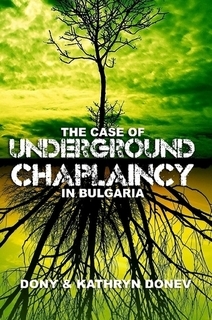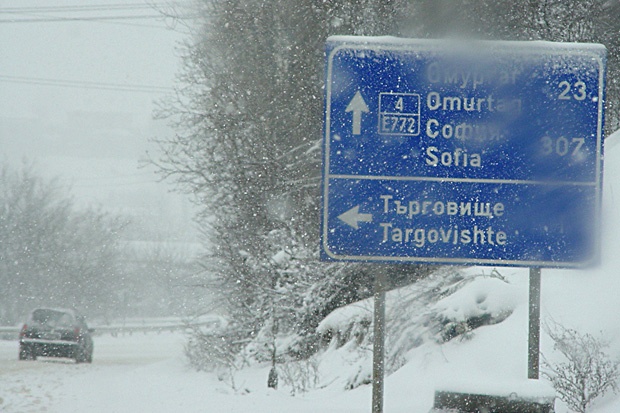Bulgarian Churches in North America
 Bulgarian Churches in North America results from a comprehensive dissertation work on emerging Bulgarian American congregations. The book incorporates some twenty years of research, which the author began while involved with the establishment of the first Bulgarian Church of God in North America initially located in the city of Chicago. The work presents an overview of the historical presuppositions and immigrant dynamics associated with Bulgarian churches is offered to enlighten the current problem of ministry. Next, a detailed contextual analysis describes the churches participating in the project. The project model design explains the research methodology and the study’s findings, which provide the first ever statistical overview of Bulgarian American congregations. The work concludes with a series of prognoses of the explored movement of evangelical churches, various considerations and an A-to-Z church planting proposal to serve as a paradigm for ministry and church planting among Bulgarian immigrant communities in North America.
Bulgarian Churches in North America results from a comprehensive dissertation work on emerging Bulgarian American congregations. The book incorporates some twenty years of research, which the author began while involved with the establishment of the first Bulgarian Church of God in North America initially located in the city of Chicago. The work presents an overview of the historical presuppositions and immigrant dynamics associated with Bulgarian churches is offered to enlighten the current problem of ministry. Next, a detailed contextual analysis describes the churches participating in the project. The project model design explains the research methodology and the study’s findings, which provide the first ever statistical overview of Bulgarian American congregations. The work concludes with a series of prognoses of the explored movement of evangelical churches, various considerations and an A-to-Z church planting proposal to serve as a paradigm for ministry and church planting among Bulgarian immigrant communities in North America.
Pastor-Agents of the Secret Communist Police in Bulgaria Revealed
Silence in the face of evil is itself evil: God will not hold us guiltless.
Not to speak is to speak. Not to act is to act.
Dietrich Bonhoeffer
Pastors who served as agents of the secret police during the Communist Regime in Bulgaria are being revealed this week through special legal provision of the Bulgarian Constitution, which allows secret government dossiers and archives to be made public. The law excuses ministers who are retired, immigrated or deceased as it pays special attention to people who continue to serve on denominational boards, heads of religious organizations or church pastors.
The released records have revealed a significant count of Bulgarian evangelical pastors, who have served directly under the Communist government as secret agents and are currently serving in lead positions in their respective churches and denominations. At least 17 agents have infiltrated the Pentecostal churches in Bulgaria (including the Assemblies of God, Church of God and other charismatic denominations). The count is overwhelming in comparison with the Bulgarian Orthodox Church representing some 90% of Bulgaria’s general population with only 11 regional bishops with secret police dossiers.
The newly released documents reveal that these pastor-agents served the Regime through willfully betraying and reporting fellow ministers and their respective ministries, regularly submitting the names of new believers joining their congregations and the activities of their churches as a whole. Special interest in their reports seems to have been given to “foreign religious emissaries” – missionaries from sister-denominations in other countries who visited Bulgarian evangelicals with the purpose of bringing moral and financial support, smuggling Bibles or just encouraging the churches during their time of trials and tribulations under the Regime.
Even more disturbing is the lack of definite and unified response on behalf of the current denominational leaders and the repulsiveness of the general public on the issue as a whole. While the Bulgarian Evangelical Alliance appealed for prayerful but fair dealing with the said misconducts, the Bulgarian Assemblies of God has chosen to deal with the issue internally behind closed doors and the Church of God in Bulgaria has postponed discussion to its general meeting in March or perhaps May. Several outspoken leaders from the Congregational and Apostolic churches have been unsuccessful in bringing about a public debate involving all Bulgarian Protestants, while journalistic investigations in the Christian media have been openly attacked in attempt to be kept silent.
It is understood that many of the said pastor-agents were coerced to serve as such through pressure in their jobs, friends, families and in some cases even their children. Yet, the Bulgarian churches are now struggling to cope with the fact that leading ministers within their denominational structures have continually and purposefully reported on the life of the church, thus betraying fellow believers and ministers.
Bulgaria Battles Snow and Flooding
SOFIA, Bulgaria — Swollen rivers in Bulgaria and Greece burst their banks Tuesday, leaving dozens of homes underwater, as Bulgarian officials declared a day of mourning for eight people confirmed killed after a dam collapse nearly washed away their village.
Bulgaria’s civil defense agency warned that two other, bigger dams were also on the brink of spilling over and residents were urged to prepare for an evacuation. Authorities have started a controlled release of water from the dams to prevent overflow.
Europeans across the continent have been battling more than a week of extreme weather, with thousands still trapped by snow in remote, mountain villages in the Balkans; hundreds — most of them homeless — dead after temperatures hit as low as minus 33 Fahrenheit (minus 36 Celsius); and authorities now facing the prospect of flooding caused by melting snow.
A day after the dam burst, the Bulgarian government declared a day of mourning, and streets in the village of Bisser were covered with sticky mud as people returned to their water-logged homes.
At least a dozen houses had collapsed, uprooted trees blocked roads and smashed cars sat abandoned along deserted streets. Veterinary officials were collecting the bodies of dead animals from streets still covered in snow.
Bisser Mayor Zlatka Valkova said she received a phone call about the dam and tried to get out of her office in time to alert people of the eight-foot-high (2.5-meter) torrent. “I rushed out on the street, but then I saw the wave,” she said. “It was terrible, it came with such speed that I couldn’t do anything.”
The village’s 800 residents have been provided with food, water and medicine while the recovery operations continue. District Governor Irena Uzunova said eight people have been confirmed dead, and the whereabouts of an elderly couple remain unknown.
Bulgarian President Rosen Plevneliev and the EU commissioner for humanitarian aid, Kristalina Georgieva arrived Tuesday to assess the extent of the damage. “The next two weeks will be very difficult and the melting snow could make the situation very complex,” Georgieva told reporters in Bisser. Georgieva voiced sympathy over the loss of lives and of property of people “who had not been wealthy even before the disaster.”
Further south, the heavy rain caused the Maritsa River to overflow its banks, leaving dozens of homes under water in the city of Svilengrad near the Greek border. Rescue crews helped transport nearly 100 residents to temporary shelters.
In Greece, rescuers had to help five elderly people escape from their flooded homes after the river Evros burst its banks near the country’s northeastern border with Bulgaria. Several elderly residents were also evacuated overnight from another three villages in the area.
Clinton urges Bulgaria to be energy independent
Schools in Bulgaria Close Due to Extreme Winter
Roof of Bulgaria’s Plovdiv Airport Collapses under Snow Cover
Bulgarian Railways Warn Passengers to Avoid Travel
Flowers of Bulgaria
THE CASE OF UNDERGROUND CHAPLAINCY IN BULGARIA
 This book embodies documents, articles and essays dealing with the rediscovering and reestablishing of chaplaincy ministry in Bulgaria after the fall of the Berlin Wall in 1989, including the envisioning and establishment of the Bulgarian Chaplaincy Association and it’s proposal for the reestablishment of chaplaincy within the Bulgarian Armed Forces submitted to NATO’s Manfred Wörner Foundation in 2006, which subsequently led to the envisioning and establishment of the Master’s Program in Chaplaincy Ministry via the Bulgarian Evangelical Theological Institute and New Bulgarian University of Bulgaria in 2009.
This book embodies documents, articles and essays dealing with the rediscovering and reestablishing of chaplaincy ministry in Bulgaria after the fall of the Berlin Wall in 1989, including the envisioning and establishment of the Bulgarian Chaplaincy Association and it’s proposal for the reestablishment of chaplaincy within the Bulgarian Armed Forces submitted to NATO’s Manfred Wörner Foundation in 2006, which subsequently led to the envisioning and establishment of the Master’s Program in Chaplaincy Ministry via the Bulgarian Evangelical Theological Institute and New Bulgarian University of Bulgaria in 2009.
Bulgaria in Pictures: Churches
[slideshow]
Bulgaria in Pictures: Streets
[slideshow]
Bulgaria in Pictures: Nature
[slideshow]
John Bevere LIVE from Bulgaria
[slideshow]
In October, John Bevier visited Bulgaria for a powerful Holy Ghost conference. Our team was able to broadcast LIVE the three-day event over the internet to some 20,000 people in and outside of Bulgaria.
Election Results in Bulgaria 2011
- Plevneliev, Kalfin to Contest Presidential Run-off
- VP Front-Runner: Bulgaria Said Yes to Reforms in Tough Times
- Bulgaria President Front-Runner: We Promise Active, Non-Partisan Rule
- Borisov: Presidential Election Success Proves Bulgaria’s Fiscal Prowess
- Exit Poll: Bulgaria Candidates Face Run Off
October 23, 2011
- Bulgaria’s 2011 elections update: Of voting, vote-buying and a goat
- International Observers Monitoring Bulgaria Presidential Vote
- 12% of Bulgarians would sell their vote
- No incidents reported at the beginning of the Election Day
- Voting in Plovdiv’s 52 poling station resumed
- 353 observers of the ISI and FEPS to monitor the election process
- Polls open for Bulgaria’s presidential, local election
- Bulgaria to elect new president, mayors, as monitors voice concerns about possible vote-buying
October 22, 2011
- Bulgaria Declares Day of Reflection in Elections Eve
- Bulgaria’s Battle for Mayors – Who? Where? How?
- Strong Police Presence Planned for Bulgaria’s Election Day
- Name of Ex Bulgarian Tsar Saxe-Coburg Missing in Voter Lists
- GERB Presidential Candidate Rosen Plevneliev: Bulgaria’s Goal Must Be Modern European State
- Independent Presidential Candidate Meglena Kuneva: Bulgaria
- Needs Non-Partisanship and Competitiveness
- October 22 – day of reflection ahead of president, local elections in Bulgaria
- Election’s Perspectives for Bulgaria (2011)
- Bulgarian Presidential Election 2011































